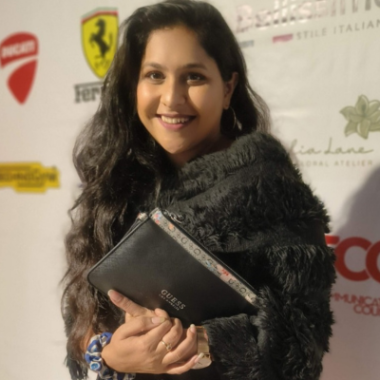
International Relations MA – 2026
If you’re curious, ambitious, and maybe just the right kind of chaotic (the world-changing kind), Westminster won’t just keep up, it’ll catapult you forward.
Why did you choose the University of Westminster?
When you're bouncing back from a spine injury and an existential crisis, you don't settle - you search for a place that aligns with your ambition and understands reinvention. Westminster ticked all my boxes: an International Relations course with practical relevance, a focus on energy security (my area of interest), and a reputation for empowering diverse voices. Also, let's be honest, if a university can make someone feel like a go-getter again after months of bed rest, it's clearly doing something right.
How has your experience been studying in London?
Imagine being in a city where your classroom discussions on diplomacy spill over into real-life embassies and energy roundtables. That’s London for me - intellectually buzzing, professionally alive, and just the right amount of chaotic for someone like me who thrives on movement. Whether I’m catching a panel at Chatham House or just people-watching at Southbank, this city constantly reminds me: I’m exactly where I need to be.
What have you particularly enjoyed about your course?
Studying International Relations at Westminster feels like being handed a backstage pass to the global theatre - complete with climate change debates, energy diplomacy drama, and decolonial plot twists. I’ve especially enjoyed the module on Regional Dimensions of Energy Security. The Kosovo field trip was a standout - nothing like seeing geopolitics unfold in real-time to shake up classroom theory.
How have you found academic support as part of your studies?
Supportive? Absolutely. Intimidatingly smart? Without a doubt. From line-by-line feedback on essays to impromptu pep talks in between seminars, my lecturers have been the wind beneath my thesis - and occasionally my unofficial caffeine suppliers too. They don’t just show up to teach; they show up for you. They challenge your thinking, nurture your growth, and most importantly, they see your potential even when you’re struggling to see it yourself. Coming back from a spinal injury and a confidence dip, I didn’t just need academic support - I needed belief. And Westminster’s faculty delivered that in abundance, every single time.
Are there any stand-out facilities associated with your course?
While International Relations doesn’t involve lab coats or camera rigs, it’s far from just textbooks and theory. From immersive mock United Nations simulations to access to world-class research databases and libraries, Westminster makes global politics feel tangible. The Cavendish library, with its quiet corners and reliable Wi-Fi, has become my second home - comfortably heated, endlessly resourceful, and always ready for my next caffeine-fuelled study sprint.
Tell us about your experience of using the University Careers and Employability Service
Yes, and it’s been a transformative journey. The Careers and Employability Service has been instrumental in refining my CV and prepping for roles that intertwine IR and journalism. Their guidance made “employability” feel exciting, not daunting. Achieving the Postgraduate Gold and Platinum levels of the Westminster Employability Award was a testament to my commitment to personal and professional growth. These accolades not only enhanced my profile but also provided tangible recognition of my efforts, making me feel more confident and job-ready. The structured activities and workshops were invaluable in navigating the competitive job market.
Tell us about any activities that you have undertaken outside of your course
Westminster life isn’t confined to lecture halls - trust me. From a field trip to Kosovo and Belgium, where we visited the UN, NATO, EULEX, and the European Parliament (yes, I geeked out), to a thought-provoking documentary screening organised by my Just Development lecturer, Dr. Ipshita Basu, opportunities here go far beyond the syllabus. I also pursued the Westminster Employability Award up to Platinum, which pushed me to grow professionally. Each experience - from academic trips to engaging with real-world institutions - made theory leap off the page and into practice. Westminster doesn’t just teach International Relations; it lets you live it.
What would your advice be to someone considering studying at Westminster?
Don’t just pick a course, pick a launchpad. If you’re curious, ambitious, and maybe just the right kind of chaotic (the world-changing kind), Westminster won’t just keep up, it’ll catapult you forward. With lecturers who open doors to real-world experiences and a campus buzzing with opportunity, this place is fuel for the driven. Pro tip: bring comfy shoes, field trips here often include embassies, think tanks, or global institutions.
What's the best aspect of being a University of Westminster student?
The people. Where else can you debate Julian Reid’s critique of humanitarianism with someone from Norway, sip coffee with a human rights advocate from Nigeria, and then plan a joint research paper with a peer from Congo, all in one week? The diversity here isn’t just visual; it’s intellectual, emotional, and refreshingly real.
What was the most surprising or unexpected aspect of your Westminster experience?
What surprised me most was how quickly I felt like myself again. I arrived at Westminster still physically healing and emotionally off-balance after a major injury. But within weeks - thanks to supportive lecturers, soul-stirring seminars, and one unforgettable field trip - I wasn’t just surviving; I was thriving. Westminster didn’t just help me pick up the pieces. It reminded me of my voice, my ambition, and the fact that I still had fire in me.
Your Thoughts
Westminster didn’t just give me a course; it handed me back my momentum. As someone who’s reported from conflict zones and produced award-winning shows, I thought I knew intensity. Turns out, academia at Westminster is a different kind of thrill, one that’s setting me up for my next big leap in energy journalism and international diplomacy.